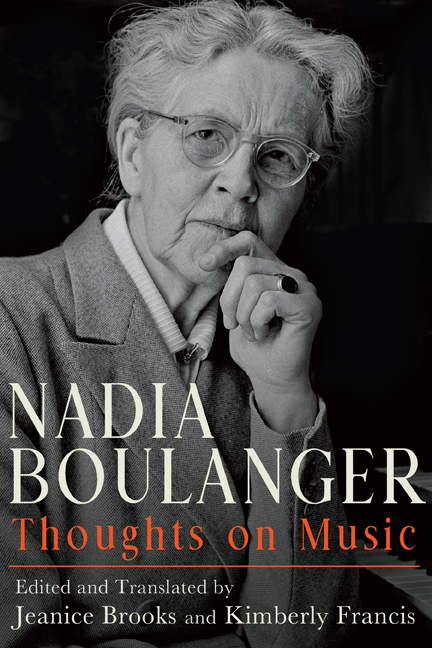Book contents
- Frontmatter
- Contents
- List of Illustrations
- Acknowledgments
- Editorial Apparatus and Critical Notes
- Note on Translations
- List of Abbreviations
- Timeline of Nadia Boulanger’s Life
- Introduction
- Part One Journalism, Criticism, Tributes
- Part Two Lectures, Classes, Broadcasts
- Bibliography of Nadia Boulanger’s Published Writing
- General Bibliography
- Index
“La Musique Religieuse,” La Revue Musicale 4, no. 11 (October 1922, special number devoted to Gabriel Fauré): 104–11 (complete text)
Published online by Cambridge University Press: 15 October 2020
- Frontmatter
- Contents
- List of Illustrations
- Acknowledgments
- Editorial Apparatus and Critical Notes
- Note on Translations
- List of Abbreviations
- Timeline of Nadia Boulanger’s Life
- Introduction
- Part One Journalism, Criticism, Tributes
- Part Two Lectures, Classes, Broadcasts
- Bibliography of Nadia Boulanger’s Published Writing
- General Bibliography
- Index
Summary
The Religious Music
The history of Christian music deserves to be studied with the greatest care, since although it is well known in principle, in reality it is known only from a chronological point of view. We know the main phases of its evolution; we even cite a certain number of composers: but we are only partly aware of plainchant and are almost completely ignorant of the works that separate it from the modern period; we fail to study the Holy Books, which are sometimes difficult to read, so numerous are the parables, the allusions, and the metaphors; we neglect to associate to the sense of the music the sense of the liturgical texts, which are too often read, recited, and sung in paying attention to the usual pronunciation at best. How, then, to understand the complete beauty of religious music, how, then, to give a faithful interpretation of it, to grasp its character, or even, when there is cause, its weaknesses, its errors?
When one rereads some admirable Gregorian monodies, some curious examples of diaphony or discant (of which we find sometimes some very noticeable traces in the music of Erik Satie), the motets of the three great periods, when one comes to the cantatas, to the oratorios, to the immense sonorous edifices of Bach, of Beethoven, of Berlioz (about which there are many things to say), of Liszt, and when one arrives at the incomparable serenity of Gabriel Fauré, one has a fairly accurate picture of what the development of an idea so great that it has guided the Christian world for twenty centuries—just as another great idea guided ancient Greece—has meant for Art. One understands how artists have a need for an overall direction, and what strength they find in a collective feeling that in reality gives the greatest independence to each one of them, from the very fact that in assigning them a goal, it liberates them. And this is, no doubt, one of the profound reasons that has brought the greatest artists of all periods to gather around the Church, who has stimulated them to work for her, to dedicate the best of their hearts and spirits to her, to live in her shadow and in her light.
- Type
- Chapter
- Information
- Nadia BoulangerThoughts on Music, pp. 201 - 207Publisher: Boydell & BrewerPrint publication year: 2020



